COMPANIONSHIP
Consider these factors before adopting a pet during the pandemic
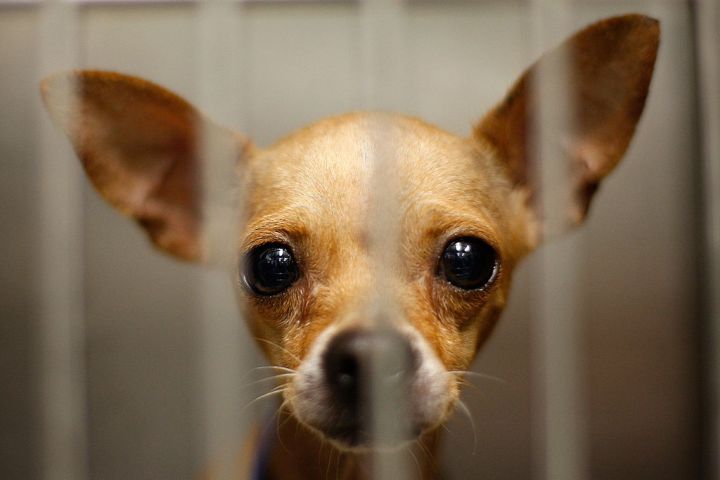
Animals have been found to be a great source of comfort and emotional support — an attractive selling point for anyone stuck at home and battling with feelings of despair in times of crisis like the Covid-19 pandemic. However, deciding to adopt a pet comes with a sizeable checklist of responsibilities before committing to caring for another life.
A few months after South Africa’s lockdown was instituted in March last year, and before our next-door neighbour’s fluffy tabby tomcat, Trigger, decided to move in and make up our minds for us, my partner and I had been toying with the idea of adopting a pet.
We were both confined to working from home full-time with a rationale that not only could we provide some support to one of the many overburdened animal shelters in our area, but that adding a furry friend to our two-person pack would help stave off the sentiments of loneliness, melancholia and purposelessness that had begun to dominate our moods.
It turns out we were not the only ones.
Head of fundraising and communications at the Animal Welfare Society Stellenbosch (AWSS) Jessica Perrins reports that their facility had a noticeable increase in pet adoptions during lockdown.
“All of our dogs were placed in foster care for the lockdown period as well as most of our cats. During this period it gave the public (foster parents) the opportunity to see just how rewarding it is to save a rescue animal. We had many ‘foster fails’ (fosters that became forever homes) as well as families and individuals adopting prior to lockdown,” Perrins explains.
Savannah Marescia, who is an adoptions manager at dog adoption NPO Oscars Arc, also reported an initial increase in the number of dogs adopted last year recording an additional 41 adoptions between March 2020 to July 2021, compared with the period between March 2018 and July 2019.
“People knew they were settling into their homes, were not going away and if they were ever considering adopting a dog then that would be a good time to do it,” Marescia says.
Perrins echoes Marescia’s reasons for the increase in adoptions adding, “The lockdown period was a very lonely time for most, especially those living away from family or on their own and the addition of a dog or cat definitely provides wonderful companionship. With many employees now able to work from home, those who were concerned about not having the time to commit due to being at work, are now able to open their homes to a pet and have plenty of time to bond and train them”.
While many human-animal interaction studies purport that animal companionship can be therapeutic, Education and Community Engagement Coordinator of global animal welfare organisation Four Paws Tanya van Tonder warns against hinging the decision to adopt a pet solely on the animal’s ability to provide emotional support in times of turmoil.
“Animals can offer wonderful emotional support especially in times of crisis like the pandemic. Their presence reduces stress and has a positive impact on mental health. It would be fantastic if the lockdown brought about unprecedented levels of animals finding loving homes. But it’s crucial to consider carefully if you can provide for a pet for the rest of their life, not just during the lockdown period so that everyone benefits at the end of the day.”
Communications, resource development and education manager for the Cape of Good Hope SPCA Belinda Abraham agrees that there was a noticeable boost in the number of adoptions last year.
“There are definitely more people considering the companionship that a pet can bring and how much value that can actually add to our lives. However, if people are considering adopting a pet they do need to keep in mind that there is currently a work from home environment which is wonderful and makes for an excellent time to adopt but they need to be able to start preparing their pet for a time when they may have to be more office bound,” she says.

Benoni SPCA appeals to the public to adopt pets. (Photo: Gallo Images / Lee Warren)
The cost of companionship
One of the biggest considerations when deciding to adopt a pet is affordability. Because caring for a pet properly can be an expensive venture — the extent of which is often only realised after the fact — it is at the top of the checklists of all six of the pet adoption organisations interviewed for this article.
“People generally look at their income and lifestyle before deciding to adopt. We actually include questions in our application form, asking applicants if they realise the cost of private vet bills, especially after hours veterinary services if there’s an emergency. It is something prospective owners have to take into consideration when adopting,” says head of adoption at African Tails in Cape Town Sandy Clifton.
Annual vaccinations are integral to caring for a pet. Katie Butler from the adoption team at Tears Animal Rescue explains that puppies need three to four initial vaccinations for optimal protection against all viruses such as Canine Distemper, Parvovirus, Adenovirus type 2, Parainfluenza, Leptospirosis and Rabies at ages six, nine and 12 weeks.
Kittens require two to three initial vaccinations to cover viruses such as Feline Herpesvirus type 1, Calicivirus, Panleukopenia, Chlamydia, Leukemia and Rabies between the ages of nine and 12 weeks. These initial vaccinations can average a cost of R480, depending on the veterinarian.
“After the initial vaccinations, pets require an annual vaccination booster (covering the same viruses), which at a private veterinarian will cost you in the region of R450 for a dog and R650 for a cat,” adds Butler.
Deworming is advised once every three months, which can cost between R18 and R58.
If your pet falls ill and requires a vet consultation, this can cost between R320 and R600, depending on whether you elect to have pet insurance as well as whether your pet requires treatment or medication.
Other expenses to consider include dry food, the price of which varies considerably, depending on the brand. Wet food can cost between R32 and R40 for four pouches per month; flea treatment can cost up to R600, depending on the size of the pet and the severity of the flea case; and then there’s pet training, grooming, toys, beds, blankets, food bowls, collars and leads to consider; and kennel or cattery fees if you go away.
To give us an idea of how much a pet can cost monthly, the AWSS’s Perrins says she has a medium-sized rescue dog which she says costs her about R1,000 per month.
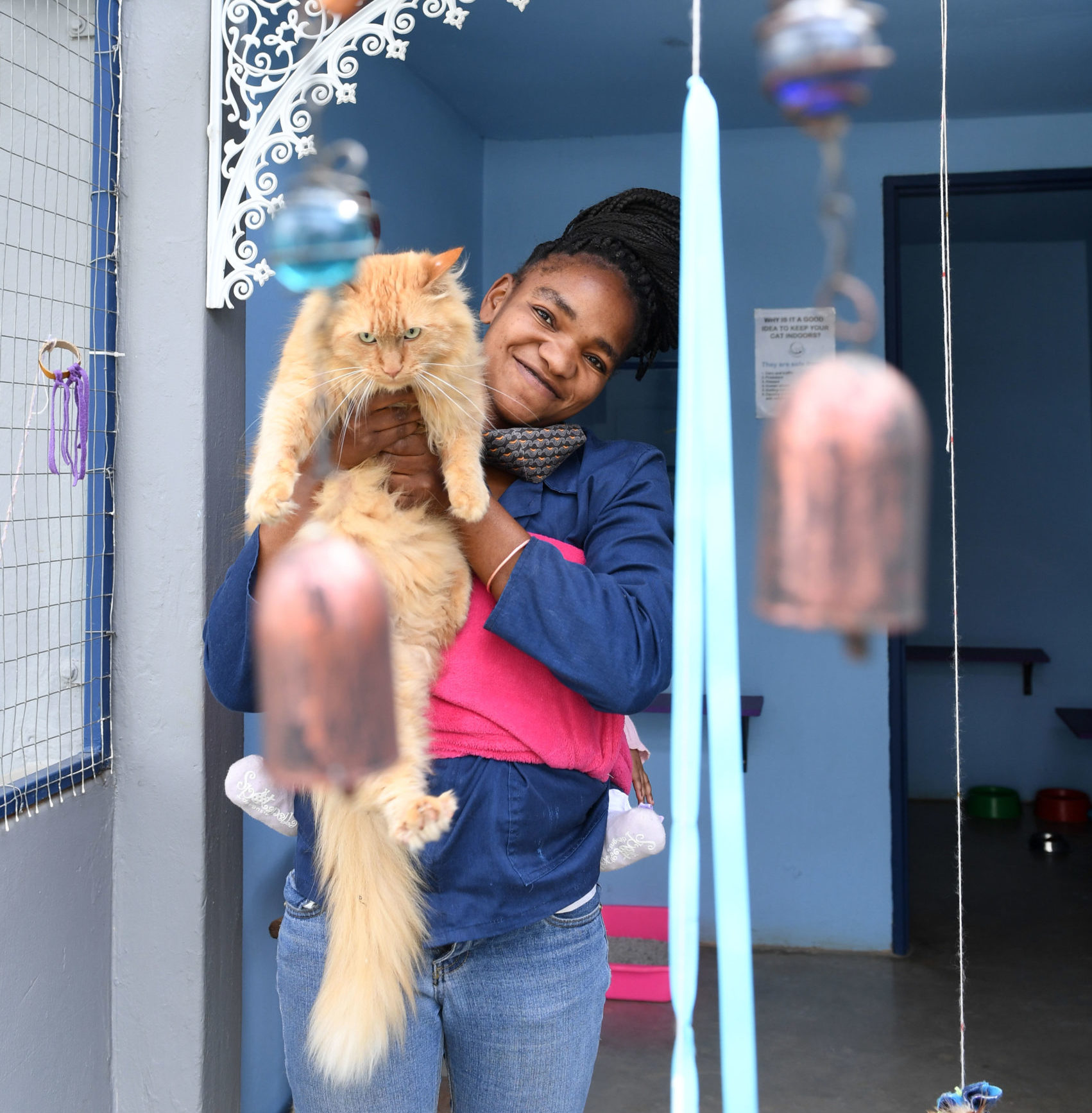
Faith Gorimani (Mother) and Thembelihle Nkomo (six months old) moved house from Thembisa to the Kitty and Puppy Haven three days before lockdown. The sanctuary has been taking care of homeless and abused animals for 20 years by providing them with medical care and shelter while they await adoption. (Photo: Gallo Images / Lee Warren)
The next important item on the adoption-ready checklist is time and stable living conditions. A lot of pets require regular attention, stimulation and exercise and Tears’ Butler says the level of responsibility that comes with adopting a pet needs careful consideration.
“You need to be able to look after this pet for up to 20-odd years. You need to accept that you are taking on a big responsibility, you will be the caretaker of a little furry life,” Butler says.
The AWSS’s Perrins implores people not to make a permanent decision based on temporary feelings when it comes to pet adoption. “Daily we hear of animals being returned, dumped or abandoned at welfare shelters due to people facing the reality and responsibilities that come with owning an animal.”
Unfortunately, pet returns are currently a problem that overburdened animal shelters are experiencing due to a lack of understanding of the responsibilities attached to adopting a pet, coupled with the knock-on effects of Covid.
“We have also seen an increase in dogs being returned, across all organisations, due to people losing their jobs and no longer being able to afford to care for their pets due to the pandemic,” says African Tails’ Clifton.
“Definitely within the past few months, we are starting to see a little more panic, death, people feeling unsettled, and financial pressure on some families needing to rehome their dogs,” adds adoption pop-up manager and coordinator Jacqui Martheze from Woodrock Animal Rescue in Pretoria.
Tears’ Butler says to consider how unstable the pandemic has made our daily routines and that, while many of us might be working from home now with a lot of expendable time, this could change.
“Everything is currently not normal, and it may be like this for a while, but things might also change very quickly, and in many different directions and so you have to consider potential knock-on effects of the pandemic on your living situation before adopting a pet,” comments Butler.
Abraham adds: “You are ready to adopt and care for a pet when you have the resources to do so and, by resources, I don’t just mean financial resources but the resource of time too because our pets require more than just food and water. They are called companion animals for a reason, because they also require an investment of our time spent with them.”
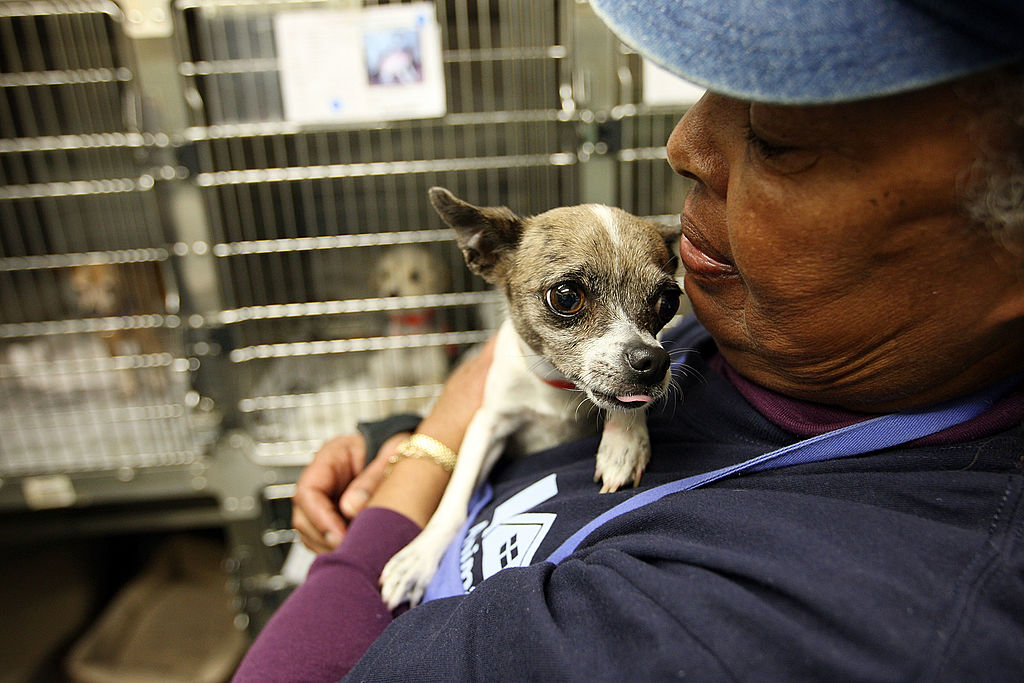
Shelter worker Laura Guyden holds a Chihuahua that awaits adoption at a Los Angeles Department of Animal Services shelter on 15 December 2009 in California, US. (Photo: David McNew / Getty Images)
The process
Once you have considered your financial position, living situation and your ability to commit time and energy to your potential pet for the next 15 to 20 years, you will be required to go through an adoption application process.
Due to Covid-19 restrictions, many adoption facilities are currently not accepting walk-ins and require scheduled adoption appointments.
The pet adoption process can vary slightly from facility to facility but, generally, the majority of pet adoption organisations follow a set procedure.
Firstly, you will be required to fill out an application form. At some facilities like Oscars Arc, this can be done either online or at their Woof Project centre or adoption pop-ups.
The AWSS’s Perrins shares that the application forms are generally used to determine whether the property is secure and suitable for the chosen pet. If a puppy or kitten is being adopted, the AWSS requires someone to be home for the first six months from their adoption date.
African Tails works on a foster basis, which means the animals they rescue are kept in foster homes instead of designated kennels. In this case, once an application form has been processed, the adoption officer gives the applicant the foster’s contact details so that they can arrange to meet the animal they are interested in.
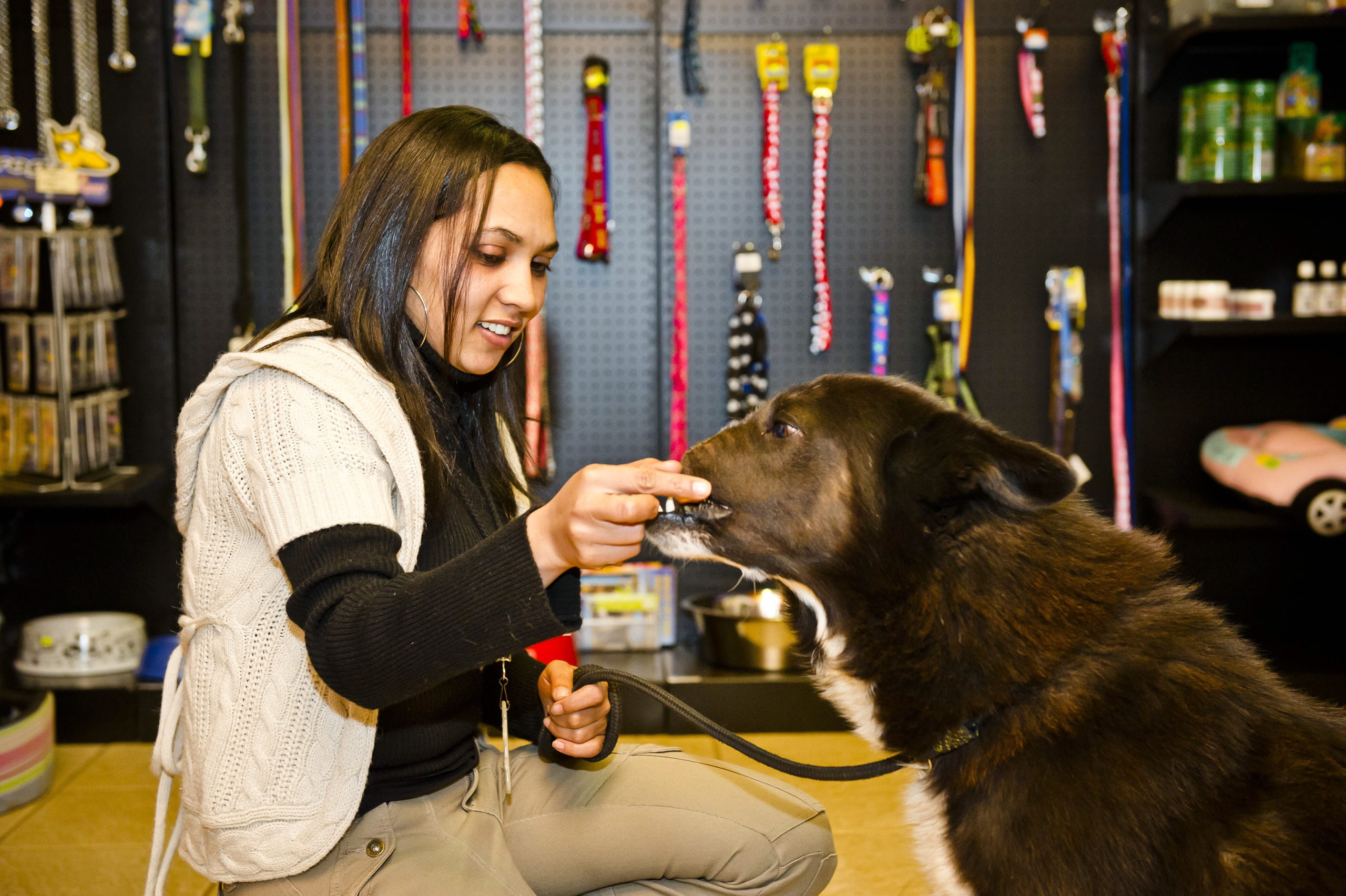
Maximus is fed a treat by his new owner Shanna Kock at the Wet Nose Animal Rescue Centre on 20 July 2011 in Pretoria, South Africa. (Photo: Gallo Images / Nelius Rademan)
Once the application has been approved and the applicant still wants to proceed with the adoption process, an adoption officer is sent to do a home check. Due to Covid-19 restrictions, Oscars Arc requires virtual home checks. Most facilities will conduct regular check-ins via phone or video call and do physical home checks if they feel something is amiss.
“We set up meetings with the family and potential new doggie. Sometimes, this includes a social between their existing dogs and ours, sometimes it includes a social to see how the kids react to the doggie and vice versa, and we also occasionally need to cat-test our doggies as well. If everyone gets along and is happy, then we proceed with the adoption fee,” says Tears’ Butler.
The adoption fee is also facility-dependent and can range from R700 to R1,500. This fee covers sterilisation, microchipping, deworming, a de-flea treatment and vaccinations up until the pet is adopted.
“Oscars Arc offers the ‘Name Your Price’ adoption fee. However, a generous donation of R1,200 or more enables us to cover the costs of this adoption. This donation sponsors another dog coming in, the marketing, feeding, and vet bills,” says Oscars Arc’s Marescia.
Which pet suits you?
The pet adoption application forms coupled with discussions with potential adopters also help the adoption organisation to pair specific pets with specific lifestyles.
Pet adoption organisations have animal adoption profiles on their websites or social media pages which include factors like size, age and gender to browse through.
African Tails’ Clifton admits that it is slightly more difficult to match mixed breeds with certain lifestyles but that is where their fostering model comes in handy.
“We get feedback from the fosters on the dog’s energy levels. If a dog is young and high energy, he will be suited more to a young couple who love the outdoors and being active, and who may have children as well. Older, small, low-energy dogs are more suited to older people who are not as active, or people who live in quiet complexes or smaller properties where there could be size restrictions,” says Clifton.
“Younger, single people living in flats are also more keen on cats. If there is a dog that clearly has a lot of a certain breed in them, we will definitely take that particular breed into consideration. For example, a dog that clearly has a husky in them is more suited to a home with a garden with high walls as they are prone to jumping over walls and do not cope well in small apartments or homes without a garden or very small garden,” Clifton adds.
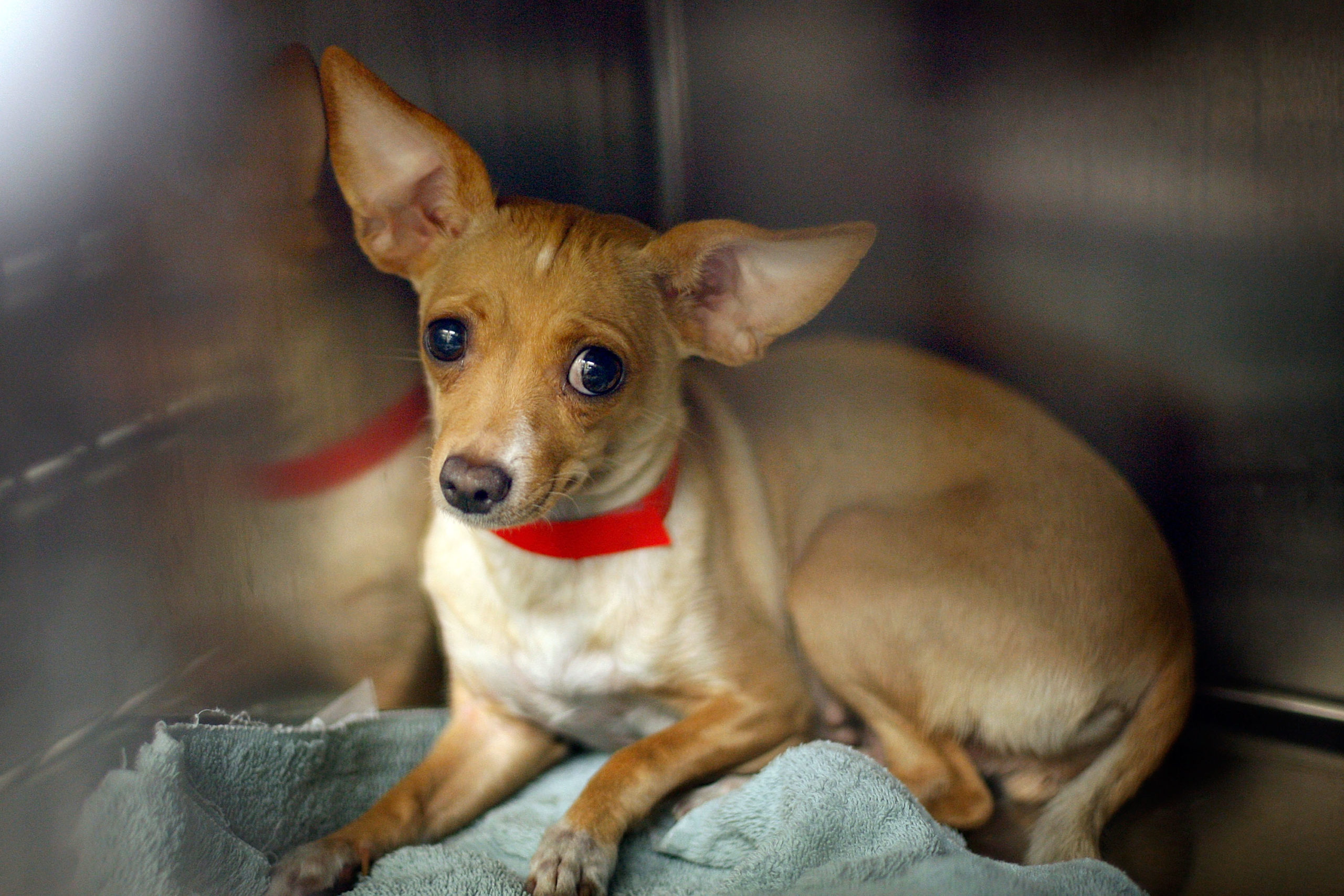
A Chihuahua awaits adoption at a Los Angeles Department of Animal Services shelter on 15 December 2009 in California, US. (Photo: David McNew / Getty Images)
Perrins says that the adoption staff at the AWSS consider factors like the age, size and temperament of the pet in correlation to the adoptee’s family environment – “We might suggest a puppy that can grow up with the children, especially if they are very young children or we may have an adult dog that previously lived with children six years and older”; their physical living space – “You may live in a flat on a busy street and an indoor cat would be best suited”; and existing pets – “Some dogs are better suited to living alone. You may have cats and the dog you’re interested in is not cat friendly. If you have an older dog, we might suggest a calmer, adult dog.”
The AWSS also acknowledges that every family is different and that the best way to see if a particular pet is right for a certain family is for them to meet and spend time together.
“Every family is different, which is why we do meet-and-greets and, often if a potential adopter has another dog, we advise that they let their dogs choose. We have introductory areas where qualified animal behaviourists will accompany you and see how the pets respond to one another. With the cats/kittens, we allow adoption clients to go into the cattery area and sit and let your cat/kitten choose you,” says Perrins.
If you are still unsure, some adoption facilities like Tears and the AWSS offer a “foster first” option, which provides potential pet owners with the opportunity to care for an animal and see whether it is a commitment they are ready and able to make.
Adoption successes
At the beginning of July, Careshia Steenkamp adopted Harry from the Oscars Arc’s pop-up adoption called “the Woof Project”. Being her first time adopting a dog, Steenkamp described it as one of the biggest moments of her life, acknowledging the weight of responsibility she had taken on.
“I had been thinking about adopting a pet for about two years prior to welcoming Harry into my life. I always wanted to care for a dog or any animal, but didn’t feel like I was in the right phase of my life.

Bailey. (Image: Supplied / Catherine Del Monte)
Adoptee Cate Morris had always followed Animal Welfare Society Stellenbosch’s website quite closely and cooing over the furry-faced profiles became a regular occurrence. One evening when she was scrolling through the AWSS’s adoption list, three-month-old Bailey caught her eye and her heart.
“I live alone and once Covid hit and I started working remotely from home full time, I started feeling like I needed company and responsibility,” Morris says.
Morris says Bailey is a bright light in her life, but to those considering welcoming a pet into their homes she comments, “I think you must really be ready for the responsibility because it is a big one that requires money, time, effort and patience.”
“I haven’t slept properly in over a month. Because Bailey is still a puppy, I am up very early in the morning to take her outside and play with her and then throughout the day I dedicate time to socialise her and participate in her general growth,” Morris explains.
Luna, a tiny stray found abandoned in Heideveld, Cape Town, full of mange and parasites, transformed into a lovable puppy in one of African Tails’ foster homes and was quickly scooped up by Eloise Middleton and her daughter Lené.

Luna. (Image: Supplied / Catherine Del Monte)
Nine-year-old Lené was delighted to be able to put her dream of becoming an animal rescuer into practice when she welcomed an eight-week-old Luna into her family’s home at the beginning of July.
“I often get mad or sad and I don’t know why. For example, I can get upset at a pair of shoes that don’t fit or if I drop something or spill water and Luna helps me through these feelings,” says Lené.
When asked what should be considered before adopting a pet, Lené comments, “It has to be a decision that your whole family agrees with. Then you have to decide who is responsible for what, like walking, playing and feeding.”
The Middletons have two cats that Luna is still learning to get along with so Eloise adds that fostering a pet first is a great way to see if your potential pet will match well with a particular living situation.
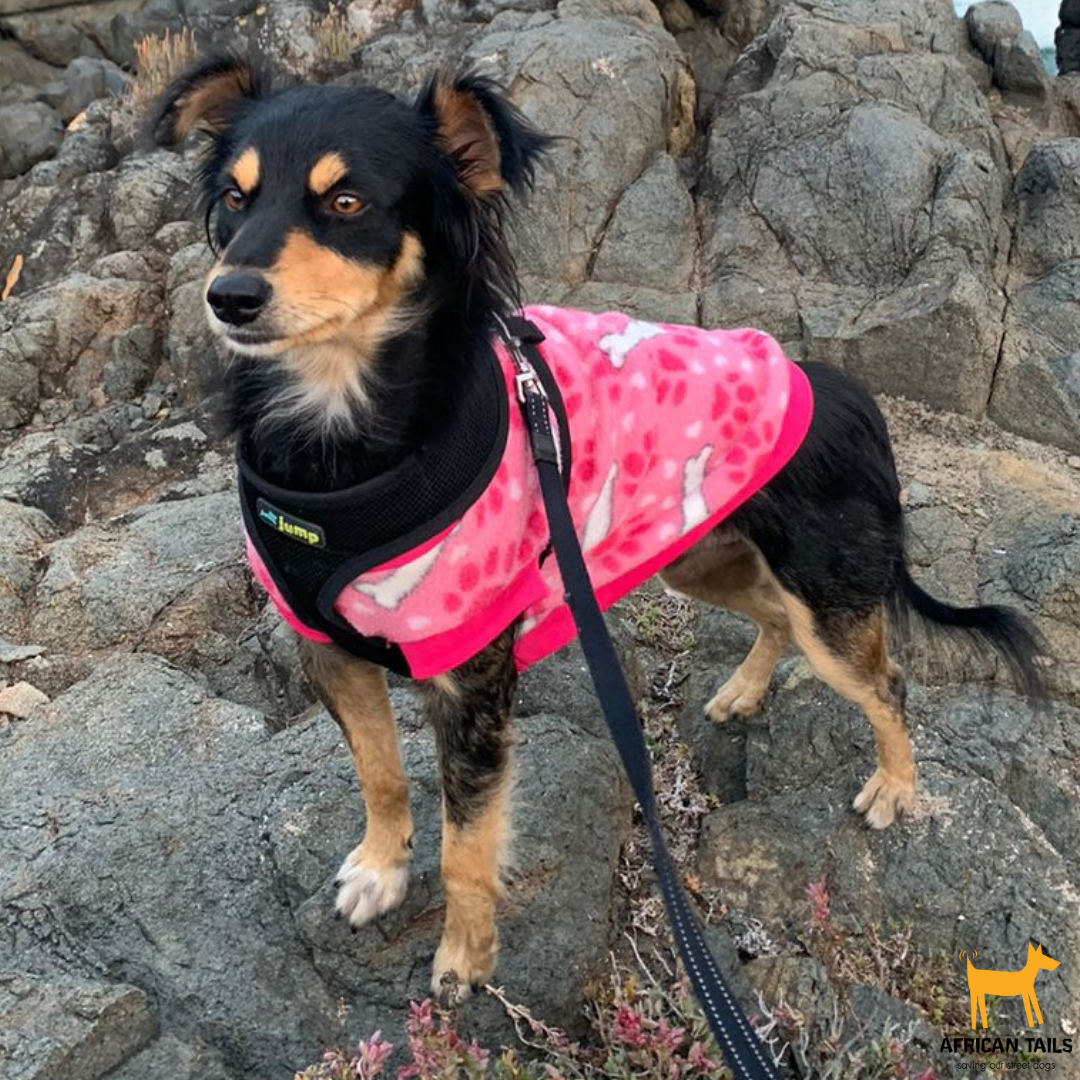
Henry. (Image: Supplied / Catherine Del Monte)
African Tails black-and-tan pup Henry came into Jacky van Wyk and her family’s life in May.
“Both my sons are on the autism spectrum. They have Aspergers and struggle emotionally so we thought that it might be therapeutic for them to have a dog,” comments Van Wyk. “It turns out Henry has been a source of therapy and comfort for all of us!” Van Wyk adds.
She advises conducting thorough research on the temperament and personality of the pet before adopting.
“You have to do your research with regards to a pet’s personality. We wanted to be sure about the decision we were making so as not to end up in a rehoming situation and happened to have a friend who is an animal behaviourist. She went to meet Henry and found he was the perfect match,” says Van Wyk.
“You must be prepared for the journey, have patience and just be prepared to give a lot of love,” she adds. DM/ ML


















 Become an Insider
Become an Insider
Comments - Please login in order to comment.